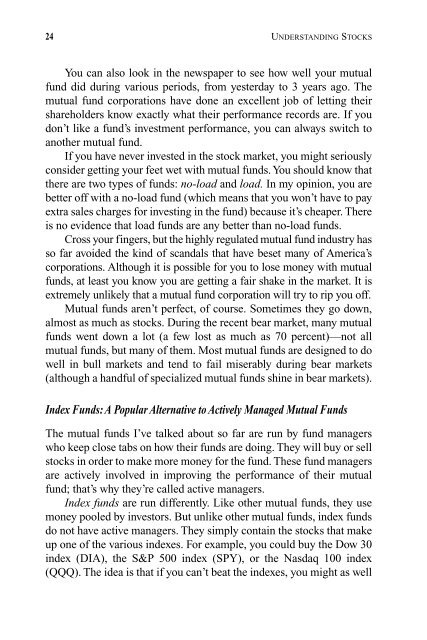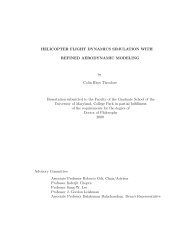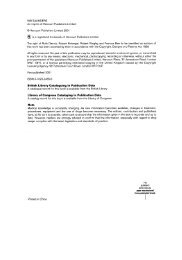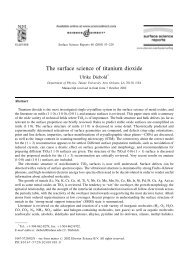Understanding Stocks
Understanding Stocks
Understanding Stocks
Create successful ePaper yourself
Turn your PDF publications into a flip-book with our unique Google optimized e-Paper software.
24 UNDERSTANDING STOCKS<br />
You can also look in the newspaper to see how well your mutual<br />
fund did during various periods, from yesterday to 3 years ago. The<br />
mutual fund corporations have done an excellent job of letting their<br />
shareholders know exactly what their performance records are. If you<br />
don’t like a fund’s investment performance, you can always switch to<br />
another mutual fund.<br />
If you have never invested in the stock market, you might seriously<br />
consider getting your feet wet with mutual funds. You should know that<br />
there are two types of funds: no-load and load. In my opinion, you are<br />
better off with a no-load fund (which means that you won’t have to pay<br />
extra sales charges for investing in the fund) because it’s cheaper. There<br />
is no evidence that load funds are any better than no-load funds.<br />
Cross your fingers, but the highly regulated mutual fund industry has<br />
so far avoided the kind of scandals that have beset many of America’s<br />
corporations. Although it is possible for you to lose money with mutual<br />
funds, at least you know you are getting a fair shake in the market. It is<br />
extremely unlikely that a mutual fund corporation will try to rip you off.<br />
Mutual funds aren’t perfect, of course. Sometimes they go down,<br />
almost as much as stocks. During the recent bear market, many mutual<br />
funds went down a lot (a few lost as much as 70 percent)—not all<br />
mutual funds, but many of them. Most mutual funds are designed to do<br />
well in bull markets and tend to fail miserably during bear markets<br />
(although a handful of specialized mutual funds shine in bear markets).<br />
Index Funds: A Popular Alternative to Actively Managed Mutual Funds<br />
The mutual funds I’ve talked about so far are run by fund managers<br />
who keep close tabs on how their funds are doing. They will buy or sell<br />
stocks in order to make more money for the fund. These fund managers<br />
are actively involved in improving the performance of their mutual<br />
fund; that’s why they’re called active managers.<br />
Index funds are run differently. Like other mutual funds, they use<br />
money pooled by investors. But unlike other mutual funds, index funds<br />
do not have active managers. They simply contain the stocks that make<br />
up one of the various indexes. For example, you could buy the Dow 30<br />
index (DIA), the S&P 500 index (SPY), or the Nasdaq 100 index<br />
(QQQ). The idea is that if you can’t beat the indexes, you might as well

















